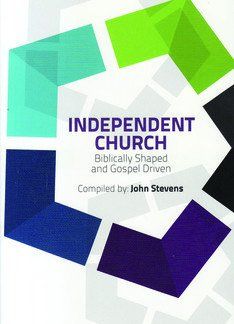Some would suggest that the Independent view of the church is the product of ‘don’t know any better’ ignorance or of sheer pragmatism that sits loose to biblical principles. But the key conviction of the authors of this book is that Independency is rooted in Scripture and centred on the gospel as the dynamic of church life and mission.
This work is the product of the Fellowship of Independent Evangelical Churches and sets out to advance its vision of the church, but its usefulness should not be limited to churches belonging to that grouping.
Contributors define what is meant by Independency, biblically and theologically. They also chart the history of Independent churches in the UK and beyond. While it is argued that the Independent model is shaped by the clear teaching of Scripture, the writers are not dogmatic when it comes to some of the finer points of church government and organisation.
Objections to Independency, such as a tendency towards isolationism, are acknowledged and measures suggested to help churches avoid becoming isolated and inward-looking.
A useful chapter is devoted to Independency and the state. Independents believe in the separation of church and state, but that does not necessitate the view that believers should withdraw from society. It is stated, rather, that Christians should seek to contribute to the common good, while affording freedom and toleration to those who do not share our faith.
Independency is not a recipe for theological anarchy and confessional confusion. Bill James advocates Independents adopting a full-scale confession of faith, such as the Savoy Declaration or Second London Baptist Confession, to help safeguard the distinctive doctrinal stance of the local church.
A more basic statement, like the FIEC’s ‘Basis of belief’, enables Independent evangelical churches to enjoy fellowship together while not always in agreement on every point of doctrine.
Attention is devoted to many other important matters, such as Independency and preaching, elders, support for pastors, training for ministry, the role of women and mission.
Space does not permit detailed comment on each contribution. Suffice to say that, while the reader may not agree with everything in this book, the material presented will help provoke thought on the renewal of Independent church life and mission in 21st century Britain.







